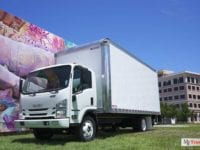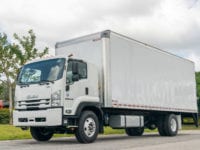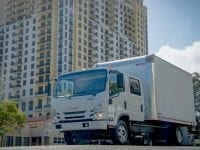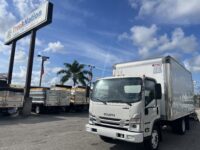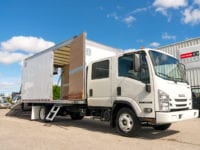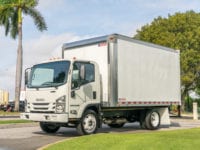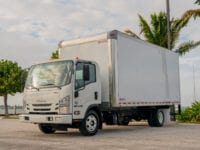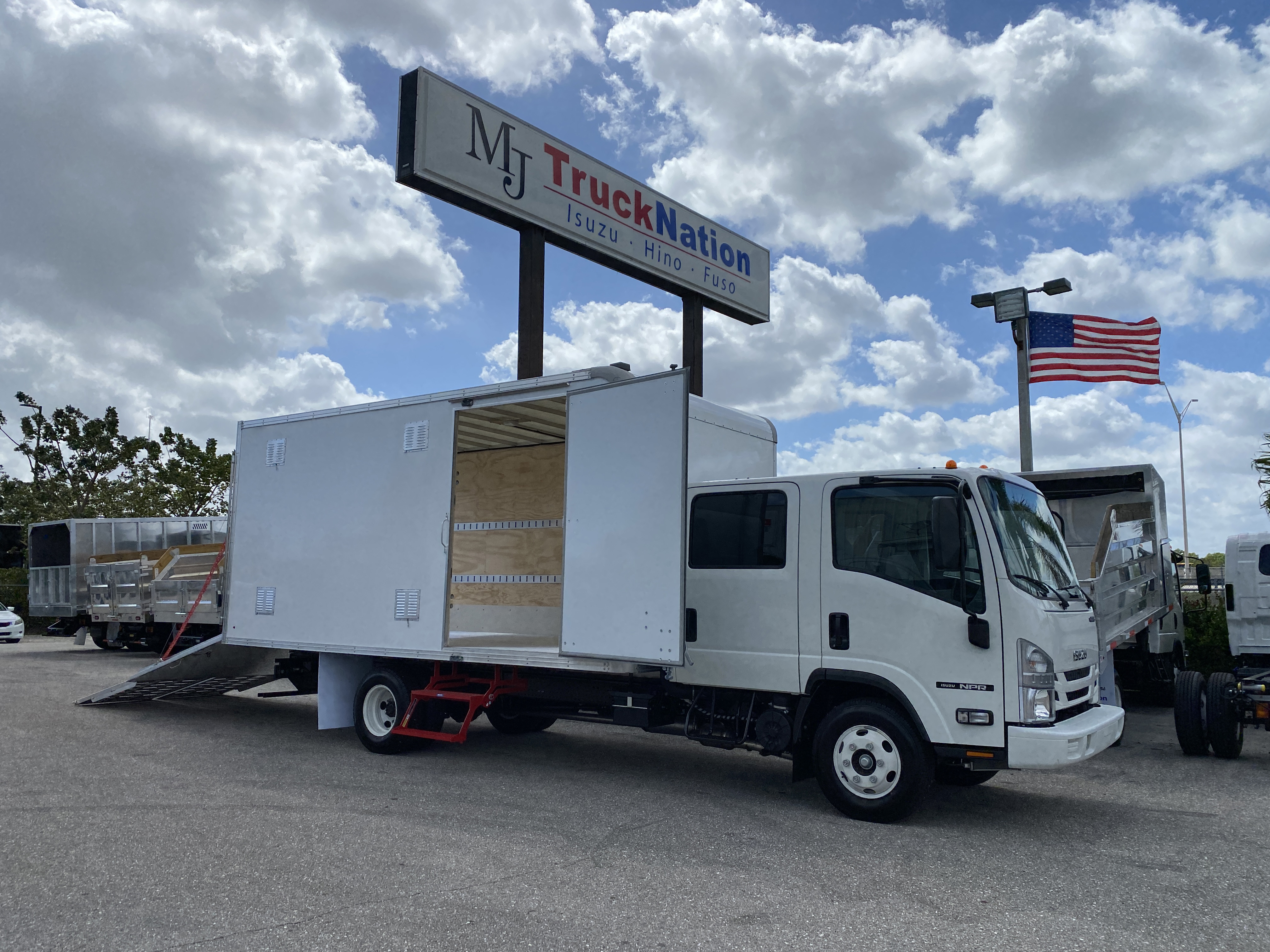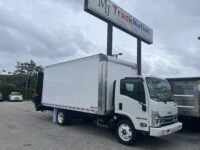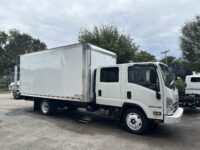Commercial Box Trucks for Sale
We have a great selection of Commercial Box Trucks for sale. Commercial Box Trucks, also known as Straight Trucks or Reefer Trucks, are a staple for a multitude of service businesses. Medium-duty Box Trucks are widely used in moving and delivery industries but in many other fields as well.
What’s in a Commercial Box Truck?
Most Box Trucks come standard with features such as roll-up rear doors, cargo tie rails and/or e-tracks, curbside door, interior lighting, and translucent roofs. Both standard and automatic transmissions are available and you’ll also have your choice of an engine that runs on gasoline or that’s diesel fueled.
Our Medium-Duty Commercial Box Trucks
Our typical inventory includes famous manufacturers such as Isuzu, and Hino, Fuso. They generally range between 10 to 26 feet constructed in both aluminum and steel. We carry cab-over Box Trucks and traditional-style Box Trucks as well. Our new trucks come with a warranty and even our used trucks are available with warranties.
Our most popular Isuzu is the NPR series which is an excellent choice for affordability because the initial price is low and it gets great mileage. For heavier duty work, Hino Box Trucks are beasts.
Hino Box Trucks are rugged. We carry a nice selection of Hino Box Trucks for those who need a heavier Gross Vehicle Weight Rating (GVWR) and stronger suspension for larger jobs.
Other excellent medium-duty Box Trucks are the Freightliner and Freightliner M2. The GMC Box Van is small but is efficient for small jobs as far as light-weight cargo vans go. Chevy and Dodge models are competitive but aren’t as tough as Isuzu and Hino Box Trucks. Ryder Box Trucks are very popular for rental Box Trucks and are sometimes sold to the public at auctions.
BOX TRUCK SPECS
Size
When purchasing a new or used Box Truck, it’s imperative to get the size that’s the right fit for your needs. While a 12-foot truck works well for delivering a living room or bedroom set, if you are planning to move an entire house to a different location, you’ll do best to choose a find a larger Commercial Box Truck for sale – such as a 26-foot model. Going too small can cost you in the long run because you’ll have to turn some jobs down. Then again, if a smaller truck can do the job you require, why spend extra money on purchasing, licensing, maintaining, and operating a larger one?
Weight Capability
Be sure to check the chassis GVW so you don’t overload your Box Truck. You may be able to squeeze all your cargo into a smaller truck but if it weighs too much, you’ll end up damaging your truck. The object is to find a balance between your required cargo space and the weight of your goods.
Height
Pay attention to the height of the truck too. Be sure to measure your goods to make sure they fit, even if the item is something you only sometimes carry, you will want to accommodate it as well. Also measure any equipment you use to load your items such as a dolly.
The height of the actual truck is important too. Will it clear the areas you will be going underneath to load and unload? Will it clear the spots in between point A and point B? You’d be surprised how often this very important consideration is overlooked. The last thing you need is to get stuck under a bridge you can’t clear or even worse, have an obstacle take the top off your truck.
Door Location and Type
You will need to consider the manner in which you will load and unload your good to and from the truck in order to determine what type of door your Box Truck should have and where it should be located. Will you be pulling up to a dock? Will you need to squeeze into a fit fitting area to load and/or unload? Do you need roll-up doors or the swing-out type? Some outfits need a side and back door. Determining these things are vital to know before choosing a Commercial Box Truck and can save you the heartache of ending up with a vehicle that does not serve you well.
Chassis Wheel Size
One of the most overlooked consideration of a Box Truck is the size of the chassis wheels. Light-duty Box Trucks usually have small tires that are about 19.5 inches. They sit lower to the ground which may make the truck too low to load and unload at the dock. Be sure to measure the dock if you plan to use one and go with a Commercial Box Truck with a chassis wheel size that accommodates your needs.
Mismatched body lengths and chassis wheel sizes are a big problem when it comes to Commercial Box Trucks. Don’t assume because the truck comes that way that it’s alright. If the body is too long or too short or the chassis it too light or sits too low, you’re going to pay the price. It’s important to consider your load too. How heavy is it? What size it is? While delivering Styrofoam cups may be fine for a Box Truck that sits short on a chassis, hauling lead bars or heavy furniture might be disastrous. The weight distribution is key. Improper distribution is bad for the rear axle and the entire truck. If you are in doubt, you can call the truck manufacturer.
Cab
Don’t forget to figure how many people will be riding in the cab so you can decide between a single or double cab. You also want to consider how many miles you intend to drive with your workers. Even though you may not have a crew initially, if you plan to add workers at a later date, you may want to go with a double cab Box Truck right off the bat so you don’t have to worry about purchasing one later on. But, if your business is a one-man or one-woman show and always will be, a single cab is less expensive as a rule and still gives room for one passenger to ride along with you.
What type of material the seats are is another feature to think about. You don’t want to spend money on leather seating if the job you do with the truck is greasy and grimy. You also want to consider the fact that you may be in your truck many hours and comfort is important. Having an AM/FM stereo may be on your wish list. Weigh it all out and see what you come up with for your personal wants and needs.
Cargo Details
Don’t neglect to tend to your cargo needs before you decide on a Box Truck. Not every truck is right for every need so be sure your requirements match what the truck will provide.
Sifting loads are likely to cause damage to the interior of your truck and to the body of it as well. Besides, it’s dangerous. How will your load be secured? Do the math and figure the logistics. Determine how many rows of slats, tie-downs, or e-track you need. Does the truck you are looking at provide that? If not, can you perhaps custom order or have more added on at a later date? If not, the truck is not the correct fit for you.
Also take a look at the location of the securing features (tie-downs, e-tracks, etc.). How far off the ground are they? Will the set-up be effective and efficient for your load? Do you need a second rear door? Let us assist you in finding the exact truck that fits all of your needs.
Here to Help
Still not sure what size truck you should get? At MJ TruckNation, we are experts in commercial trucks. We are here to help guide you every step of the way so you can drive off in the Commercial Box Truck that is ideal for your individual needs.
Special Features Available for Box Trucks
If you run a business that requires special needs for your Commercial Box Truck, you can custom order them on a new truck or have them added onto a used truck. Some of the most common special features are:
AC
If you live in a hot climate, you will need AC in your Commercial Box Truck. To drive without an AC unit is dangerous and very uncomfortable. Many models come with AC but if not, it can always be added in. Heat is always installed in a standard model.
Lighting
Although many Commercial Box Trucks come equipped with lighting inside the cargo area, it may not be enough for you or the lighting may not be laid out properly to suit your needs. Finding someone to add or rearrange lighting is not difficult and oftentimes, you can specify your requirements when ordering a new truck.
Floor Type
The floor of your Commercial Box Truck is something very important to consider. If your load is too heavy, it might fall through a wood floor. Then again, you don’t want to pay extra for a steel floor if a cheaper wooden one will suffice. If you buy a Box Truck with a floor that won’t accommodate your load, you can have a stronger one put in or, you can custom order a heavy-duty floor.
Also think about other factors besides just the weight. Is there a chance your cargo will spill liquid or sweat? If so, a wood floor may not be wise. There are ways to amend most any type of floor such as rust-proofing metal flooring and water-proofing wood floors.
Forklift Package
If you are going to be using a forklift, typically you will need a Class 6 Box Truck or larger with 22.5-inch wheels and tires. You can also reinforce the floor with cross-members, a rear-end plate, and a threshold plate. In the event that your truck doesn’t come with a forklift package, you can add one on.
